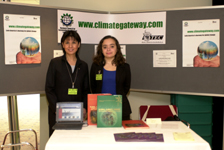 |

|
|
 |
Special
Report on Selected Side Events at UNFCCC COP-6
published by the International Institute for Sustainable Development
(IISD)
in co-operation with the UNFCCC Secretariat
|
 |
|
|
Events convened on Saturday 18
November 2000
|
|
Differentiation of future commitments -
principles + consequences
presented by the University of Utrecht
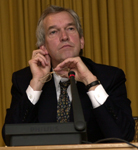 |
| Pier Vellinga, Free University of Amsterdam, oversees an expert forum on differentiation of future commitments. |
Chaired by Pier Vellinga, Free University of Amsterdam, The Netherlands, this event provided an opportunity for scientists, policy-makers and policy advocates to explore the key issue of establishing a post-Kyoto regime for differentiated commitments, based on the principle of fairness and effectiveness.
Asbjørn Torvanger, Centre for International Climate and Environmental Research - Oslo (CICERO), reviewed options for approaches to differentiation based on a notion of fairness, including equal obligations, equity and exemptions, each designed to take account of differential levels of capacity, need and guilt. His policy suggestions include the need to base any new differentiation formula on more than one principled approach.
Marcel Berk presented a paper from the National Institute of Public Health and the Environment (RIVM) on a multi-stage approach to participation in future differentiated commitments. He used RIVM's burden-sharing model, Framework to Assess International Regimes (FAIR). A multi-stage approach defines different types of commitments for different groups of Parties on the basis of pre-defined criteria. One of the findings suggests that "soft-term" accession for relatively advanced developing countries would be incompatible with stringent ecological targets.
Christoph Böhringer, University of Mannheim, presented an economic analysis of the implications of contraction and convergence (C&C). His findings suggest that without emissions trading, the C&C scenario would impose substantial welfare losses on most developing countries. With emissions trading, major developing countries stand to do even better than their current expectations under a business-as-usual scenario.
Kornelius Blok, Utrecht University, The Netherlands, introduced the Triptych sectoral approach (domestic, energy intensive, and electricity production) to burden differentiation at the EU's internal negotiations in 1997. In his paper, Blok relayed findings from an investigation of the problems involved in applying the approach beyond the EU.
Jaap Jansen, Netherlands Energy Research Foundation, outlined a flexible Multi-Sector Convergence (MSC) approach. Its distinctive characteristics are: it is based on different sectors within national economies; and per capita emissions assignments would converge over time.More information:
National Institute of Public Health and the Environment, The Netherlands http://www.rivm.nl/ieweb
Centre for International Climate and Environmental Research http://www.cicero.uio.no/index_e.asp
Netherlands Energy Research Foundation http://www.ecn.nl/main.html
Utrecht University http://www.uu.nl/uupublish/home/english/1757main.html
|
|
Reducing emissions in the transport sector new IEA policy assessment
presented by the International Energy Agency (IEA)
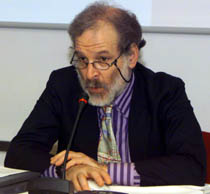 |
| Lee Schipper, IEA, describes the agency's work on transport. |
Government and motor trade representatives welcomed a new publication from the International Energy Agency, The road from Kyoto: transport policies of the US and the five European countries (2000). The book discusses domestic policies and measures to reduce CO2 emissions from the transport sector. Lee Schipper, IEA, outlined six case studies on transport-related CO2 abatement policies. He concluded that improvements in the transport sector's GHG emissions profile would require reforms, political consensus, policy initiatives, technological progress and improvements in infrastructure.
Lew Fulton, IEA, presented a report Fuel economy improvement policies and measures to save oil and reduce CO2 emissions (2000), which provides a comparison of the light-duty vehicle fuel economy in selected IEA countries. The findings show that many cost-effective technologies exist to provide reductions in oil consumption and GHG emissions in the light-duty vehicle sectors.
Beatrice Schell, European Federation for Transport and Environment (T&E), noted the lack of action on reducing emissions from international aviation. Pierre Laconte, Delegation of Belgium, also commented on the importance of considering aviation emissions. He hailed both publications and suggested additional case studies on fuel economy improvements in the EU, Japan and Eastern Europe.
Discussion: A participant stressed that consumer attitudes play a major role shifting away from a fuel-based economy. Tom Marx, General Motors, noted evidence that energy efficiency design is not a priority for consumers. Discussions expanded on: bio-fuel alternatives; concerns regarding aviation emissions; using revenues from congestion pricing to subsidize public transport action; and the absence of incentives for switching to non-fuel based vehicles.
More information:
http://www.iea.org/public/studies/files/kyoto.htm
Contacts:
Lee Schipper <lee.schipper@iea.org>
Lew Fulton <lew.fulton@iea.org>
Hans-Martin Lent-Phillips <lpm@acea.be>
Pierre Laconte <pierre.laconte@euronet.be>
Beatrice Schell <beatrice.schell@t-e.nu>
Tom Marx <tom.marx@gm.com>
|
|
IGES:
Cooperation and competition for the implementation of the Kyoto regime
presented by the Institute for Global Environmental Strategies (IGES)
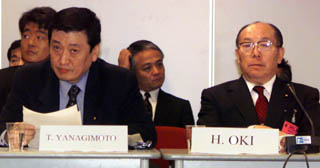 |
| H.E. Takuji Yanagimoto
and H.E. Hiroshi Ohki. |
 Okhi's speech
Okhi's speech
Kazuo Matsushita and Akio Morishima, IGES, opened the event and introduced H.E. Hiroshi Ohki, Member of Parliament, Japan, and President of COP-3 in Kyoto, who gave a keynote speech entitled, "For the success of COP-6". Ohki recalled that while COP-3 was marked by serious disagreement, delegates ultimately reached agreement on most issues. Turning to the current negotiating challenges, he implored delegates at COP-6 to conclude deliberation on the implementing Articles and move the debate forward to ensure ratification.
H.E. Takuji Yanagimoto, Member of Parliament, Japan, presenting on "Policy for reducing GHG in Japan," stated that voluntary agreements with industry need to be complemented by comprehensive legislation. He suggested action on other GHGs besides CO2.
 Naoki Matsuo , IGES, gave a presentation on "Next steps after COP-6 - Cooperation and Competition for Implementation of the Kyoto Regime". He advocated a portfolio of instruments, including emissions trading, benchmarking to identify top-runners, and subsidies to offset incremental investments by the private sector.
Naoki Matsuo , IGES, gave a presentation on "Next steps after COP-6 - Cooperation and Competition for Implementation of the Kyoto Regime". He advocated a portfolio of instruments, including emissions trading, benchmarking to identify top-runners, and subsidies to offset incremental investments by the private sector.
Michael Grubb, Imperial College, United Kingdom, suggested that the UK's approach to liberalization of the energy market, including the use of natural gas and renewable energies such as biomass, could offer useful lessons for Japan in meeting its GHG reduction targets.
Zhou Dadi, Energy Research Institute (ERI), China, emphasized the need for a new "low-carbon" emissions pattern of development and advocated the use of the CDM. RaeKwon Chung, Head of the Republic of Korea Delegation, advocated the participation of developing countries in the Kyoto Protocol and the use of GDP statistics to establish targets for their commitments. Michael Walsh, Environmental Financial Products, advocated early implementation of the Kyoto mechanisms and described the Chicago Climate Exchange plans to trade in CERs.
Discussion: participants raised issues such as opportunities for the development of natural gas projects using the CDM; ratification of the Kyoto Protocol by Annex I Parties; and the implications of the Republic of Korea's proposed "unilateral CDM."
More information:
IGES: http://www.iges.or.jp
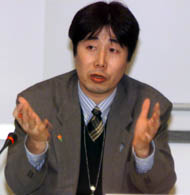 |
| Naoki Matsuo, IGES. |
|
|
Climate Policy - journal launch
presented by the Imperial College Center for Environment Technology (ICCET)
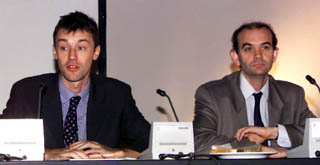 |
| Martin Hession ,
(left) Managing Editor, and Michael Grubb, (right) Editor-in-Chief of the newly launched
Climate Policy journal. |
Professor Michael Grubb, Imperial College, UK, chaired the launch of Climate Policy, a new journal which aims to address the broad spectrum of climate-related policy, economics, trade, and negotiation issues.
Grubb, Editor-in-Chief of the new publication, said the journal would offer a home for the best writing on the Kyoto Protocol, long-term perspectives on climate change, national strategies and corporate responses. Topics under consideration for future issues include: applications of integrated assessment to specific policy issues; analysis of mitigation or adaptation policies; studies of implementation and the prospects in different countries and/or sectors; policy and quantitative aspects of land-use and forestry; the design of the Kyoto mechanisms; socio-political analyses; and social studies of climate change, including work on public perception. The first edition, which will be available online, includes contributions on sinks, the CDM, liability rules, climate change impacts on Africa, post-Kyoto energy strategy in the Russian Federation, and industry.
The launch was attended by the Managing Editor, Martin Hession, Assistant Editor Ray Purdy, Associate Editor Axel Michaelowa, and Editorial Advisor Tom Jacob from Du Pont International.
More information:
http://www.climatepolicy.ic.ac.uk
|
|
PCF status and lessons learned
presented by the World Bank, Prototype Carbon Fund (PCF)
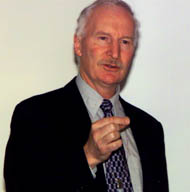 |
| Kenneth Newcombe, PCF, discusses capacity building for the development of carbon market mechanisms. |
Established by the World Bank, the PCF facilitates emissions reduction projects and provides capacity building by acting as a financial intermediary for developing country projects. It manages a portfolio of high-quality carbon credit projects. In anticipating the outcome of COP-6, the PCF aims to get a head start on developing baseline validation and verification/certification procedures.
Kenneth Newcombe, PCF, presented lessons learned from the Fund's activities. Disincentives to carbon funding, as implemented by the
PCF, include procedural costs for carbon-based funding which can represent a prohibitive percentage of the total budget for a small-to-medium-sized project. The low market value of credits, as predicted, makes carbon financing a relatively minor investment source that is unlikely to make or break a project's budget. Decreasing costs per tonne of carbon over a project's lifecycle mean that it is important to structure the market such that investments are transferable, as through the portfolio mechanism used by the
PCF.
Discussion: Discussion touched on the structure of the PCF as a portfolio of carbon credits; the issues surrounding liability and risk assessment for investors and project managers; additionality; and the difficulties of evaluating emissions reductions realized across international boundaries.
More information:
http://www.prototypecarbonfund.org
http://www.worldbank.org
Contacts:
Kenneth Newcombe <knewcombe@worldbank.org>
Chandra Shekhar Sinha <csinha@worldbank.org>
|
|
Ecosystem integrity and carbon sequestration
presented by the United States Delegation
David Hayes, Deputy Secretary of the Interior, led a workshop on responsible stewardship of land and its relation to sinks and carbon sequestration. He explained that elements of United States land-use policy, including the protection of watersheds and biodiversity, are enacted to support goals other than climate change responses but often have a carbon sequestration aspect. For example, policies targeted to prevent loss of habitat, and protect biodiversity, also tie in with carbon sequestration and sink activities. He concluded that the trend in the US is towards more protection of natural resources.
Jim Lyons, Under Secretary at the Department of Agriculture, focused on the co-benefits of forest activities. Noting the growing movement to restrict logging in national forests, he explained that the US Government is buying old-growth forest for preservation.
Linda Delgado, Chief of Staff to the Deputy Secretary of Agriculture, stated that crediting carbon as part of an integrated approached to land management and resource conservation can help the US achieve its broader environmental goals.
Dan Reicher, Assistant Secretary for Energy Efficiency, Department of Energy, presented on the benefits of biomass. He said that biomass is used for chemical products, fuels, and electric power, and forecasted that a tripling of the use of bio-energy and bio-based products by 2010 would reduce emissions by 100M tonnes of CO2. He emphasized that improving conversion efficiency from primary biomass energy to delivered bio-energy would be key to achieving that goal.
Discussion: Discussion focused on: the environmental and health impacts of an integrated biomass industry; the economics of biomass resources; and international efforts to export biomass-related technologies.
More information:
http://www.bioproducts-bioenergy.gov
http://www.eren.doe.gov
http://www.doi.gov
http://www.usda.gov
Contacts:
Jim Lyons <jim.lyons@usda.gov>
David Hayes <david.hayes@os.doi.gov>
Linda Delgado <linda.delgado@usda.gov>
Latin America's private sector contribution on climate change
presented by the Business Council for Sustainable Development - Latin America (BCSD-LA)
The launch of the web site, climategateway.com, developed by the INNOVA Center for Sustainable Development of the Monterrey Tecnologico, was announced by Sylvia Pinal, BCSD-LA. She described the web site as the first in Latin America that provides an exhaustive selection of essential materials on climate change and mitigation strategies. The site has been designed to publicize the efforts of Latin America's private sector in the mitigation of GHG pollution. She concluded that the web site is part of BCSD-LA's attempt to promote a collaborative and responsible approach to climate change in the region.
More information:
http://www.bcsdla.org
http://www.climategateway.com
Contact:
<clima@bcsdla.org>
|
|
Flexibility mechanisms: an opportunity for sustainable development
presented by the World Council of Nuclear Workers (WONUC)
André Maïssieu, WONUC, invited participants to ask questions about nuclear energy. Responding to a question on nuclear waste, he criticized the anti-nuclear lobby and presented an example of waste storage. He announced WONUC plans to organise a conference on this topic in 2001.
Maïssieu assured participants that nuclear workers do their best in nuclear power stations. Asked about the economic viability of the nuclear industry, Maïssieu said he was convinced that nuclear energy is and will remain the answer to climate change. He noted that WONUC studies indicate the possibility of halting increases in GHG emissions through the construction of nuclear reactors.
Due to a dispute over the organisation of this event, four of the five scheduled panelists did not participate.
More information:
http:// www.wonuc.org
Contact:
André Maïssieu <wonuc@wanadoo.fr>
|
|
Operationalizing the Clean Development Mechanism: accreditation, conformity assessment and standardization issues
presented by the International Organization for Standardization (ISO)
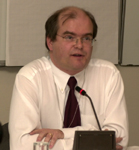 |
| Mark Barthel, ISO Ad Hoc Group on Climate Change, stated that a credible, well-accepted accreditation infrastructure already
exists. |
The outstanding issue of establishing effective rules for the CDM was explored at this ISOevent. Providing an overview of the ISO structure, Kevin Boehmer, ISO Ad Hoc Group on Climate Change, illustrated three models of institutional arrangements for the CDM. John Donaldson, ISO Committee on Conformity Assessment, spoke about the applicability to the CDM of existing ISO 14000 standards, such as assessments for environmental management systems. Based on experiences in auditing and certification of Operational Entities (OEs), Mark Barthel, ISO Ad Hoc Group on Climate Change, delivered an analysis of the CDM text and argued that clarity and guidelines are required. Such measures, he added, would contribute to creating robust and clear definitions of legal entities for the CDM. Barthel concluded that using existing ISO guidelines is the most cost-effective approach.
Discussion: Participants discussed transaction costs, performance benchmarks, the sustainable development objectives of the CDM, and verification standards for Joint Implementation.
More information:
http://www.ansi.org
http://www.csa-international.org
Contacts:
Kevin Boehmer <kevin.boehmer@csa-international.org>
Mark Barthel <mark.barthel@bsi.org.uk>
John Donaldson <jdonalds@ansi.org>
|
 |
|









